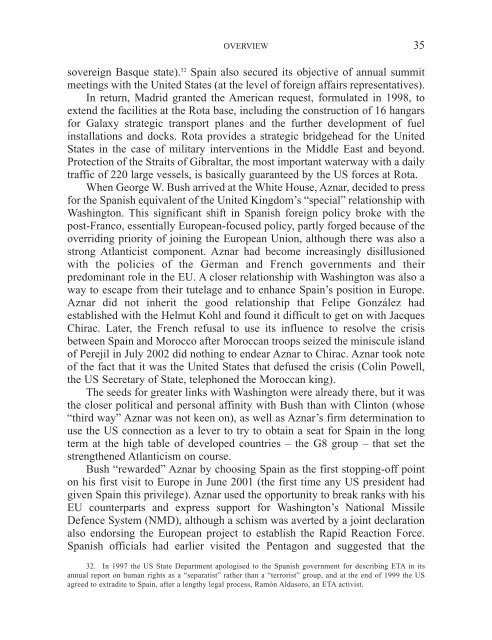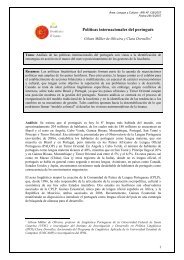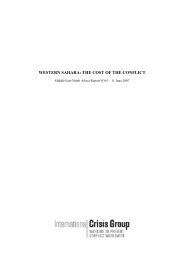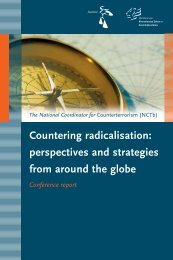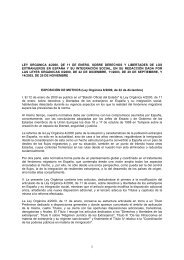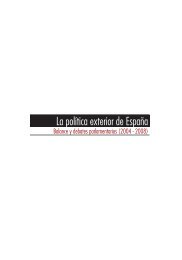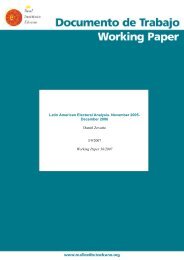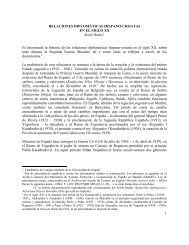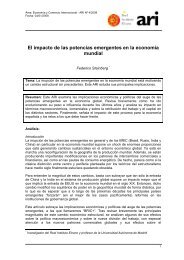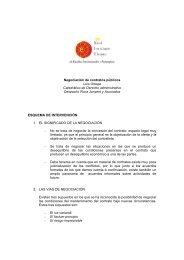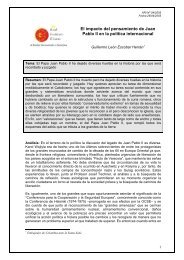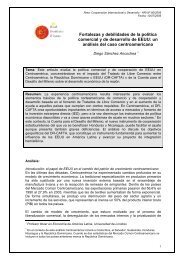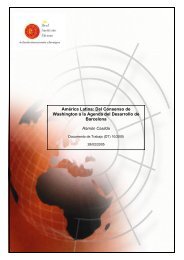Spain and the United States - Real Instituto Elcano
Spain and the United States - Real Instituto Elcano
Spain and the United States - Real Instituto Elcano
You also want an ePaper? Increase the reach of your titles
YUMPU automatically turns print PDFs into web optimized ePapers that Google loves.
OVERVIEW 35<br />
sovereign Basque state). 32 <strong>Spain</strong> also secured its objective of annual summit<br />
meetings with <strong>the</strong> <strong>United</strong> <strong>States</strong> (at <strong>the</strong> level of foreign affairs representatives).<br />
In return, Madrid granted <strong>the</strong> American request, formulated in 1998, to<br />
extend <strong>the</strong> facilities at <strong>the</strong> Rota base, including <strong>the</strong> construction of 16 hangars<br />
for Galaxy strategic transport planes <strong>and</strong> <strong>the</strong> fur<strong>the</strong>r development of fuel<br />
installations <strong>and</strong> docks. Rota provides a strategic bridgehead for <strong>the</strong> <strong>United</strong><br />
<strong>States</strong> in <strong>the</strong> case of military interventions in <strong>the</strong> Middle East <strong>and</strong> beyond.<br />
Protection of <strong>the</strong> Straits of Gibraltar, <strong>the</strong> most important waterway with a daily<br />
traffic of 220 large vessels, is basically guaranteed by <strong>the</strong> US forces at Rota.<br />
When George W. Bush arrived at <strong>the</strong> White House, Aznar, decided to press<br />
for <strong>the</strong> Spanish equivalent of <strong>the</strong> <strong>United</strong> Kingdom’s “special” relationship with<br />
Washington. This significant shift in Spanish foreign policy broke with <strong>the</strong><br />
post-Franco, essentially European-focused policy, partly forged because of <strong>the</strong><br />
overriding priority of joining <strong>the</strong> European Union, although <strong>the</strong>re was also a<br />
strong Atlanticist component. Aznar had become increasingly disillusioned<br />
with <strong>the</strong> policies of <strong>the</strong> German <strong>and</strong> French governments <strong>and</strong> <strong>the</strong>ir<br />
predominant role in <strong>the</strong> EU. A closer relationship with Washington was also a<br />
way to escape from <strong>the</strong>ir tutelage <strong>and</strong> to enhance <strong>Spain</strong>’s position in Europe.<br />
Aznar did not inherit <strong>the</strong> good relationship that Felipe González had<br />
established with <strong>the</strong> Helmut Kohl <strong>and</strong> found it difficult to get on with Jacques<br />
Chirac. Later, <strong>the</strong> French refusal to use its influence to resolve <strong>the</strong> crisis<br />
between <strong>Spain</strong> <strong>and</strong> Morocco after Moroccan troops seized <strong>the</strong> miniscule isl<strong>and</strong><br />
of Perejil in July 2002 did nothing to endear Aznar to Chirac. Aznar took note<br />
of <strong>the</strong> fact that it was <strong>the</strong> <strong>United</strong> <strong>States</strong> that defused <strong>the</strong> crisis (Colin Powell,<br />
<strong>the</strong> US Secretary of State, telephoned <strong>the</strong> Moroccan king).<br />
The seeds for greater links with Washington were already <strong>the</strong>re, but it was<br />
<strong>the</strong> closer political <strong>and</strong> personal affinity with Bush than with Clinton (whose<br />
“third way” Aznar was not keen on), as well as Aznar’s firm determination to<br />
use <strong>the</strong> US connection as a lever to try to obtain a seat for <strong>Spain</strong> in <strong>the</strong> long<br />
term at <strong>the</strong> high table of developed countries – <strong>the</strong> G8 group – that set <strong>the</strong><br />
streng<strong>the</strong>ned Atlanticism on course.<br />
Bush “rewarded” Aznar by choosing <strong>Spain</strong> as <strong>the</strong> first stopping-off point<br />
on his first visit to Europe in June 2001 (<strong>the</strong> first time any US president had<br />
given <strong>Spain</strong> this privilege). Aznar used <strong>the</strong> opportunity to break ranks with his<br />
EU counterparts <strong>and</strong> express support for Washington’s National Missile<br />
Defence System (NMD), although a schism was averted by a joint declaration<br />
also endorsing <strong>the</strong> European project to establish <strong>the</strong> Rapid Reaction Force.<br />
Spanish officials had earlier visited <strong>the</strong> Pentagon <strong>and</strong> suggested that <strong>the</strong><br />
32. In 1997 <strong>the</strong> US State Department apologised to <strong>the</strong> Spanish government for describing ETA in its<br />
annual report on human rights as a “separatist” ra<strong>the</strong>r than a “terrorist” group, <strong>and</strong> at <strong>the</strong> end of 1999 <strong>the</strong> US<br />
agreed to extradite to <strong>Spain</strong>, after a lengthy legal process, Ramón Aldasoro, an ETA activist.


